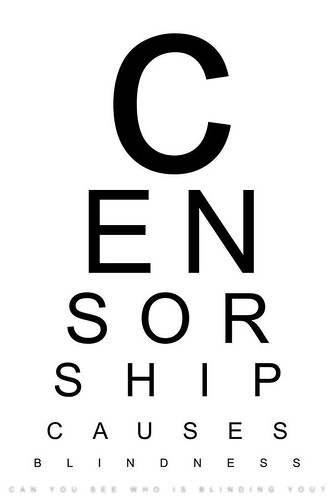
In the West we like to think of ourselves as democratic, free speakers who are entitled to our opinions and free to research and view whatever information we wish to.
However, the one tool which we have become reliant on in the last few years to help us do this, the Internet, may soon become censored as it is in China and the Middle East. The recent SOPA and PIPA initiatives have illustrated just how much users of the web value this freedom.
Many governments including China, Vietnam, Africa and United Arab Emirates have censored the web for years, making it difficult for citizens to access anything which could be considered damaging to the political powers. These countries have been named ‘Enemies of the Internet’ and are known to censor many mediums including print newspapers and the radio.

It is well known that in Cuba, citizens are not allowed to access the Internet in any meaningful capacity unless they have a special permit, these are handed out rarely and even when they are, e-mails are heavily monitored. Hardly a surprise though as Cuba is considered a Socialist state where everything from wages to travel is heavily regulated.
China and the Arab Emirates also censor what they consider to be politically sensitive speech and criticism of the government or politicians. What is interesting however, is the lack of concern about child pornography sites and content which is considered unsuitable for minors (Logjam blocks HK child porn laws – CNN, 2003). Is this not more of a concern than political slander? It appears not.
While us Westerners may be thankful for our countries attitudes towards free speech, the decision to legislate the Internet and a right to freedom of expression, this may alter in the future. Indeed, Australia rolled out a government initiative in 2009 to censor what was deemed inappropriate on the net. At this point the Australian government has blocked, maybe rightly so, sites that contain child pornography and anything deemed unsuitable for minors. This is done using URL blocking software and controlled from government offices.
However, the Australian Commonwealth is attempting to enforce mandated blocking of access to content deemed unsuitable for adults. This could be anything from sites containing negative comments about the government to discussion about politics in general. Even France, which is considered very westernised and open-minded, has a strong censorship over anything Nazi related and all offending sites are blacklisted.

In the UK, there has been a distinct shift towards increased surveillance and police measures when targeting terrorism and child abuse, whether from government intervention or Internet companies.
Many bloggers are now speculating to whether this signals a shift towards censoring becoming the norm in developed countries. In fact some Americans are starting to notice a slow progression towards censorship similar to that of China and many websites mention the interruption of Internet searches and e-mails. This allows conclusions to be made that software is already working quietly in the background, watching and monitoring what users are viewing and contributing to online.
Rense.com recently reported that CIA prison flight data has been disappearing from the search engine’s results pages. Google is actively removing ‘sensitive results’ and refusing to link to and list articles that contain information regarding the Bush administration, the War in Iraq and certain political scandals.
Among the search engines, Microsoft and AOL have also come under fire for policing the web at the behest of the government. This is not to say that all of these companies supported SOPA and PIPA, but that opposition to such bills does not entail opposition to encroachments on web freedom across the board. Indeed, the West provides most of the blocking and filtering software used in the East and so there is certainly a means to do it here.
More importantly, if it does happen, how long will it take before we realise and what exactly can we do about it?
This look at internet censorship around the world was provided by broadband comparison experts Broadband Choices.
Images credits:


